

The Crisis of Big Science by Steven Weinberg. Is 'Big Science' In Trouble? : 13.7: Cosmos And Culture. A Result Of Zero Doesn't Always Mean Zero Results. Forlorn graduate students sometimes turn to a publication called The Journal of Negative Results.* In graduate student mythology, it’s the repository for toiled-over experiments that produced nothing — no effects, no detections, no differences, nothing.
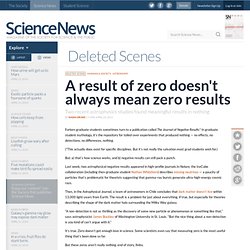
(*This actually does exist for specific disciplines. But it’s not really the salvation most grad students wish for.) But: a) that’s how science works, and b) negative results can still pack a punch. Last week, two astrophysical negative results appeared in high-profile journals.In Nature, the IceCube collaboration (including then-graduate student Nathan Whitehorn) describes missing neutrinos — a paucity of particles that’s problematic for theorists suggesting that gamma-ray bursts generate ultra-high-energy cosmic rays.
Then, in the Astrophysical Journal, a team of astronomers in Chile concludes that dark matter doesn’t live within 13,000 light-years from Earth. Leaks, hacks and science - science-in-society - 06 December 2011. Science thrives on freedom of expression and must be at the forefront of defending it THE words "science" and "censorship" do not sit easily together.

Science in the Telegraph and the Daily Mail: What’s wrong with British journalism? Illustration by Robert Neubecker.
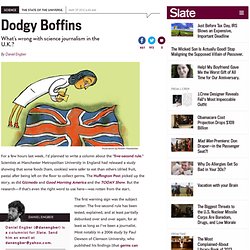
For a few hours last week, I'd planned to write a column about the "five-second rule. " Scientists at Manchester Metropolitan University in England had released a study showing that some foods (ham, cookies) were safer to eat than others (dried fruit, pasta) after being left on the floor to collect germs. The Huffington Post picked up the story, as did Gizmodo and Good Morning America and the TODAY Show.
But the research—if that's even the right word to use here—was rotten from the start. Dodgy tales of 'research' swirling the globe - opinion - 31 May 2012. By Daniel Engber For a few hours last week, I had planned to write a column about the “five-second rule.”
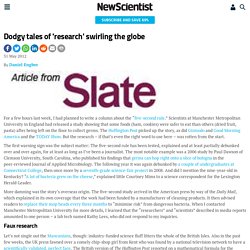
Scientists at Manchester Metropolitan University in England had released a study showing that some foods (ham, cookies) were safer to eat than others (dried fruit, pasta) after being left on the floor to collect germs. The Huffington Post picked up the story, as did Gizmodo and Good Morning America and the TODAY Show. But the research – if that’s even the right word to use here – was rotten from the start. The first warning sign was the subject matter: The five-second rule has been tested, explained and at least partially debunked over and over again, for at least as long as I’ve been a journalist. When to Doubt a Scientific ‘Consensus’ A December 18 Washington Post poll, released on the final day of the ill-fated Copenhagen climate summit, reported “four in ten Americans now saying that they place little or no trust in what scientists have to say about the environment.”
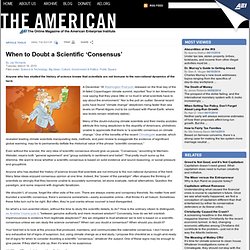
Nor is the poll an outlier. Several recent polls have found “climate change” skepticism rising faster than sea levels on Planet Algore (not to be confused with Planet Earth, where sea levels remain relatively stable). Many of the doubt-inducing climate scientists and their media acolytes attribute this rising skepticism to the stupidity of Americans, philistines unable to appreciate that there is “a scientific consensus on climate change.”
One of the benefits of the recent Climategate scandal, which revealed leading climate scientists manipulating data, methods, and peer review to exaggerate the evidence of significant global warming, may be to permanently deflate the rhetorical value of the phrase “scientific consensus.” The Financially Driven Erosion of Scientific Integrity. All else being equal, if you pay for something bad, you will get more of it.
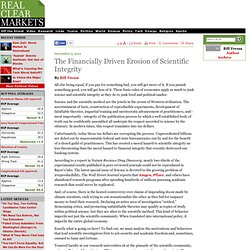
If you punish something good, you will get less of it. These basic rules of economics apply as much to junk science and scientific integrity as they do to junk food and political candor. What Is Pseudoscience? Climate deniers are accused of practicing pseudoscience, as are intelligent design creationists, astrologers, UFOlogists, parapsychologists, practitioners of alternative medicine, and often anyone who strays far from the scientific mainstream.
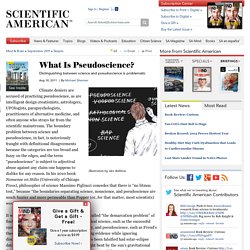
The boundary problem between science and pseudoscience, in fact, is notoriously fraught with definitional disagreements because the categories are too broad and fuzzy on the edges, and the term “pseudoscience” is subject to adjectival abuse against any claim one happens to dislike for any reason. In his 2010 book Nonsense on Stilts (University of Chicago Press), philosopher of science Massimo Pigliucci concedes that there is “no litmus test,” because “the boundaries separating science, nonscience, and pseudoscience are much fuzzier and more permeable than Popper (or, for that matter, most scientists) would have us believe.”
Princeton University historian of science Michael D. The Allure of Gay Cavemen. Third genders, two spirits, and a media without a clue.
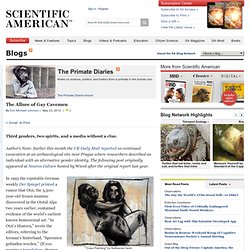
Author’s Note: Earlier this month the UK Daily Mail reported on continued excavation at an archaeological site near Prague where researchers described an individual with an alternative gender identity. The following post originally appeared at Neuron Culture hosted by Wired after the original report last year. Geology will survive creationist undermining - opinion - 11 October 2011.
Creationist infiltration of scientific conferences seems outrageous, but banning them would do more harm than good WHAT should a scientific society do when creationists want to participate in its conferences?
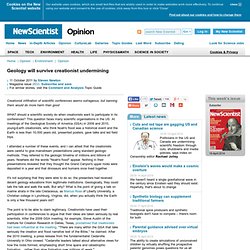
This question faces many scientific organisations in the US. At meetings of the Geological Society of America (GSA) in 2009 and 2010, young-Earth creationists, who think Noah's flood was a historical event and the Earth is less than 10,000 years old, presented posters, gave talks and led field trips. Is how to engage with the crackpot at the scientific meeting an ethical question? There’s scientific knowledge.
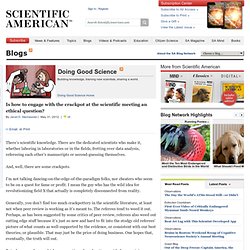
There are the dedicated scientists who make it, whether laboring in laboratories or in the fields, fretting over data analysis, refereeing each other’s manuscripts or second-guessing themselves. And, well, there are some crackpots. I’m not talking dancing-on-the-edge-of-the-paradigm folks, nor cheaters who seem to be on a quest for fame or profit. I mean the guy who has the wild idea for revolutionizing field X that actually is completely disconnected from reality. "Cargo Cult Science" - by Richard Feynman. Richard Feynman From a Caltech commencement address given in 1974 Also in Surely You're Joking, Mr. Feynman! During the Middle Ages there were all kinds of crazy ideas, such as that a piece of of rhinoceros horn would increase potency. Then a method was discovered for separating the ideas--which was to try one to see if it worked, and if it didn't work, to eliminate it.
This method became organized, of course, into science. 'Chemical-free' nonsense - latimes.com. In honor of this year's "eat healthier" resolution, my teenage son and I drove over to a local bakery in the first week of January. On the shop's window, someone had painted the words "Whole-grain bread. " So far, so good. Age of oldest rocks off by millions of years - space - 29 March 2012. In cancer science, many discoveries don't hold up. As Dutch Research Scandal Unfolds, Social Psychologists Question Themselves - Research. Red-Wine Researcher Implicated in Data Misconduct Case. A three-year investigation into a University of Connecticut biology laboratory has found its chief guilty of falsifying and fabricating data on more than two dozen papers and grant applications.
Dipak Das, director of the Cardiovascular Research Center at the University of Connecticut Health Center (UCHC) in Farmington, and his lab studied the beneficial health effects of wine (including one component resveratrol, which has been linked to life extension and other health benefits) and other foods, as well as cardiology. Web freedoms fuel 'academic spring' journal protest - science-in-society - 13 February 2012. Many authors of psychiatry bible have industry ties - health - 13 March 2012. Faulty Comparisons. 'Gay cure' psychiatrist apologises for flawed study - health - 22 May 2012. Leaders of controversial neutrino experiment step down - physics-math - 30 March 2012. Neuroscience Coverage: Media Distorts, Bloggers Rule. Brain as Icon. Spurious Positive Mapping of the Brain? Many fMRI studies could be giving false-positive results according to an important new paper from Anders Eklund and colleagues: Does parametric fMRI analysis with SPM yield valid results?
—An empirical study of 1484 rest datasets. The authors examined the SPM8 software package, probably the most popular tool for analyzing neuroimaging data. Gary Taubes — Author of Why We Get Fat and Good Calories, Bad Calories. Paranormal Circumstances: One Influential Scientist's Quixotic Mission to Prove ESP Exists. Soon Bem was led to a soundproof room, where he sat in a reclining chair with Ping-Pong ball halves covering his eyes and headphones delivering white noise. For the next half hour, as a sender in another room watched a one-minute clip on a TV monitor several times, he described the images that went through his mind. Later, shown four clips, including the one that the sender had watched, Bem ranked them in order of how closely they coincided with his own mental images. Because he gave the second-highest rating to the clip the sender had watched, the trial didn’t result in a “hit.”
TED: Even More Elitist Than We Thought. May 17, 2012 | Like this article? Join our email list: Stay up to date with the latest headlines via email. Great news! Governments agree to abolish death! Don’t mention income inequality please, we’re entrepreneurs. Philip Kitcher: The Trouble With Scientism. What Thomas Kuhn Really Thought about Scientific “Truth” Trials and Errors: Why Science Is Failing Us. Gould's skulls: Is bias inevitable in science? - life - 25 July 2011. Beware the Fausts of Neuroscience. The Right Way to Get It Wrong. Fritz Haber's Experiments in Life and Death. "The Nobel Prize and Einstein's Ghost" by Anders Barany. ‘Open Science’ Challenges Journal Tradition With Web Collaboration. Secret Computer Code Threatens Science. Why full disclosure is healthy - health - 14 February 2012. Science publishing: The trouble with retractions. A few simple checks would transform science reporting - opinion - 09 December 2011. The publication imperative - 24 April 2012.
"Publish or Perish" by Iain Chalmers.